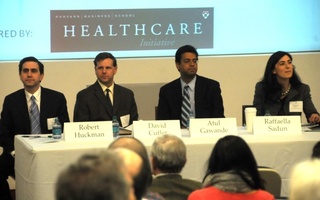Recognizing the possibility of failure is a key to excellence in both teaching and medicine, Harvard Medical School professor Atul Gawande said at a lecture at the Graduate School of Education Wednesday.
The difference between competence and greatness in these fields is important, Gawande said, because teachers and doctors affect people’s lives daily.
Top performers in these fields rise because they understand the possibility for failure, said Gawande, who is also a surgeon at the Brigham and Women’s Hospital, a professor at the Harvard School of Public Health, and a staff writer for the New Yorker.
“These are people who come to grips with their fallibility, and the fallibility of the systems they work in,” said Gawande.
Gawande used stories about emergency rooms, basketball courts, and classrooms to highlight the importance of striving for excellence.
He said that attention to details makes for success and illustrated this point with a story about James Wooden, the UCLA basketball coach whose team won the NCAA championships 10 times.
Teachers can learn important skills from coaches, Gawande said, adding that teaching involves telling students what to learn, while coaching shows students how to learn for themselves.
Gawande said he had been coached recently by a retired surgeon and colleague of his. Although Gawande said he did not anticipate that the surgeon’s advice would help him, his colleague’s small suggestions did improve his performance.
Similarly, teachers can improve by having a colleague sit in during their classes and offer criticism and advice for their future classes, Gawande said.
“What do you see when all goes right?” asked Gawande.
“Teachers are now teaching eighth graders math concepts that Euclid would have struggled with, and doctors are diagnosing and treating more than 13,000 different conditions that human beings can have,” he said.
Though doctors and surgeons work in complex systems with people’s lives at stake, there are great rewards for their difficult work, he said.“We change lives...and that is a privilege and an opportunity,” said Gawande.
Read more in News
Sex Week Event Explores Religion and SexualityRecommended Articles
-
 Surgeon Extols the Virtue of Checklists
Surgeon Extols the Virtue of Checklists -
Atul Gawande Criticizes Supermax PrisonsSupermax prisons, which are designed to hold prisoners in prolonged and strict solitary confinement, are ineffective, expensive, and detrimental to mental health, surgeon and journalist Atul Gawande said during a speech at Harvard Law School yesterday.
-
 Harvard Business School Panelists Examine Health Care Flaws
Harvard Business School Panelists Examine Health Care Flaws -
ES 227 Spotlights Medical TechnologyThe class, which was offered for the first time last spring, is the brainchild of SEAS Lecturer Conor J. Walsh, who said he was inspired by a similar class taught by his MIT graduate advisor.
-
Leaders, Not Laggards, On Health ReformIt has become a virtual tautology to say that the nation’s long-term fiscal problem is really a health care cost problem.
-
HMS Revises Pay StructureIn an effort to respond to what one hospital executive termed a “primary care crisis,” two Harvard-affiliated teaching hospitals will shift their pay structure so that doctors are paid in part based on the number of patients they treat.













